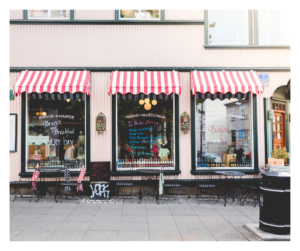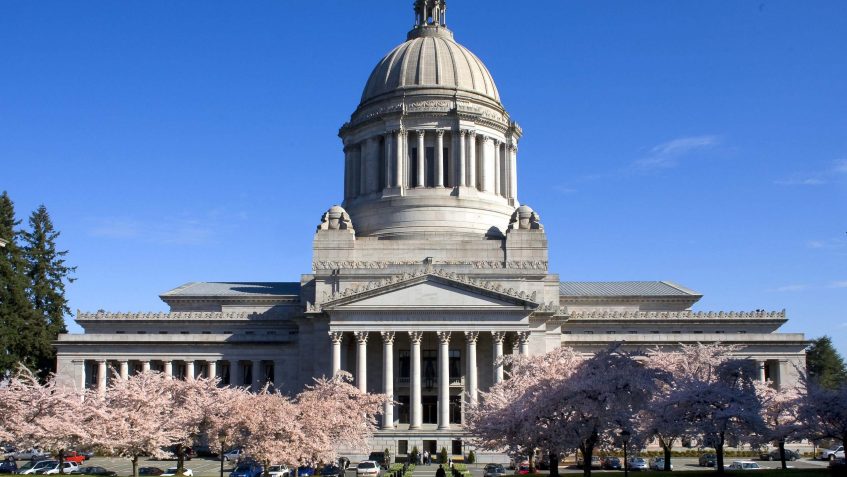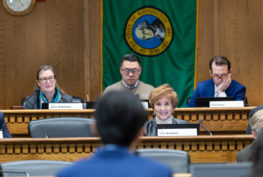Dear neighbors,
We have officially ended the 2022 legislative session and I am proud to report we made tremendous strides for everyday working Washingtonians. This year we adjourned on time for the fifth year in a row, a record not held by any legislature since 1899. That’s good government. Additional days, special sessions, cost the state millions of dollars. This exemplifies our commitment to serving Washington’s workers and families and not wasting their money.
Scroll below for a quick a digest of this legislative session’s key impacts. While we still have more work to do, I am proud of the investments and the impactful public policy we enacted to #PutPeopleFirst.
School District Consultation with Local Tribes
I am honored and excited to report that my bill to equip all school board members with tribal consultation training passed. SB 5252 which has been signed by the Governor, will result in the development of elements and procedures of a formal consultation for engaging with local tribes.
The Washington State Native American Education Advisory Committee, the Washington State School Directors’ Association’s (WSSDA) Government-to-Government Task Force, the Tribal Leaders Congress on Education, and other stakeholders are on board. And I’m looking forward to taking the training myself!
Legislation like this helps us work out how to address topics like mascots, regalia at graduation, canoe journeys and more. When schools celebrate the cultures of their students and when students feel seen, student success is more assured. I believe this well worked bill will have meaningful outcomes for many students and administrators.
Tackling the Housing Crisis 
This year marks yet another that we prioritized working families and everyday Washingtonians as we bounce back from the pandemic.
We prioritized:
$114 million infused into Housing Trust Fund to invest in and build more affordable housing.
$240 million for rapid acquisition of buildings to be used to help end homelessness.
$100 million for utility assistance.
$45 million to help transition people camping on certain public roads and highways to emergency and permanent housing.
$37 million to increase financial support for housing and essential needs for people eligible for the Aged, Blind, or Disabled program.
And we spearheaded programs to expand home ownership for low-income earners to help close the generational and racial wealth gap.
Investing in Washingtonians
This year was unlike any other—we balanced the budget after two daunting years of the pandemic and ended with a surplus. We put $2 billion into reserves for the next economic recession, leaving our state in a strong position to come roaring back. Washingtonians are ready to look to the future with hope and this budget provides an optimistic vision for our state.
We are leveraging our economic strength to double down with a budget that isn’t balanced on the backs of the working class.
This year’s supplemental budget is a statement of our values:
We received an AAA bond rating throughout the public health crisis, underscoring Washington State’s economic viability for businesses and solid financial management, even in the height of a global pandemic.
We are one of the best places to do business. CNBC and others have ranked us one of the top ten states for businesses at the same time as Oxfam has ranked us the best state for workers.
$2 billion to support the transportation budget (Multimodal Account).
$1.6 billion for emergency response (Washington Rescue Plan Transition Account).
$150 million for student loans (Washington Student Loan Account).
$120 million for electric vehicle transitioning (Electric Vehicle Incentive Account).
This budget delivers for working families, our schools, the environment and takes bold steps to reduce poverty and homelessness. It adds more than $6 billion to build upon the greatest community reinvestment this state has ever made in the two-year budget passed last April.
 Washington is Poised for a Solid Recovery
Washington is Poised for a Solid Recovery
Washington was one of the initial battlegrounds of the pandemic. Before this virus was established in other states, we were already implementing science-backed procedures to mitigate its effects.
Our hard work shows.
We have the 7th lowest death rate of any state in the US.
We are ranked the #1 state to live in by US News two years in a row when weighing factors like our economy, educational access, infrastructure, and fiscal stability.
We invested $144 million for COVID-19 response in the public health system – diagnostic testing, case investigation, outbreak response, and care coordination.
Cases are falling, but we must continue to support foundational public health so we can successfully emerge from the pandemic while building a stronger response system for the next crisis.
Keeping Small Businesses Whole
Small businesses are the beating heart of our local economies. This year we built on the work of last session and underscored our commitment to keeping small businesses healthy and operational.
Ending B&O taxes for more than 125,000 small businesses across Washington that will not pay the state business tax for 2 years, saving approximately $50 million each year (SB 5980).
$214 million in unemployment insurance tax relief for all Washington businesses, with the lion’s share going to small businesses (SB 5873).
$71 million for programs to help Washington’s small businesses recover and thrive from the Covid-19 pandemic.
 Public Safety is Community Safety
Public Safety is Community Safety
Last year’s reforms weren’t the end of our efforts, they were the beginning. And they’re working. It’s telling that the number of people who died in police encounters in the first 11 months of 2021 declined more than 60 percent compared to the year before, more than in any other state. But we still have a long way to go before we’re dialed in with an approach to policing that puts community trust and transparency first, while also giving our members of Law Enforcement the peaceful tools they need to keep us safe.
Here’s a look at how we’re building trust in our communities:
Modified use of force (HB 1735)— clarifying use of force when we’re getting people into help. Working directly with law enforcement, this legislation makes clear that physical force when detaining someone on involuntary treatment hold may be used.
Empowering our peace officers with less lethal options (HB 1719) – to help in difficult situations.
Increasing law enforcement officers’ and firefighters’ retirement benefits (HB 1701) – it gives more to our firefighters and LE professionals to keep this line of work experienced and seasoned.
Hi-Speed chases are down, hi-speed chase related deaths with them. Last year the law changed to keep the public safer by preventing car chases over low-level crimes. To pursue a fleeing vehicle, police must have probable cause to believe a person in it has committed a violent offense. We did not change that standard this year.
Justice for All Washingtonians
We’ve passed bills to:
Address Coercive Control with a bill to allow domestic violence (DV) victims to seek civil protection orders if they are victims of coercive control used by abusers to oppress and instill fear (HB 1901).
Tackle catalytic converter theft as the incidence of this type of crime continues to rise.
Cut down on cyber harassment and stalking with a bill that gives survivors an avenue to seek confidential, timely justice (SB 5628).
Establish a Missing Indigenous Person alert system to prevent the crises of missing and murdered indigenous people in our state from getting worse (HB 1725).
Crime statistics are mixed and one thing is clear: domestic abuse skyrocketed and 30% of homicides were DV victims. Alcohol abuse was also noted. The stresses imposed by Covid quarantining escalated already strained personal relationships, oftentimes to the breaking point. Our moving past the pandemic will not obviate the social emotional recovery needs immediately – we may be talking years.
Thank You
Thank you for emailing, calling, and writing to me this session. And thank you to those who joined in on our Virtual Town Halls. You were heard and appreciated. As we finish out the session, I would like to extend my heartfelt gratitude to all my district friends and neighbors for their commitment to a forward moving and forward-thinking 41st community.
It has been an honor to serve,
Lisa Wellman,
State Senator


